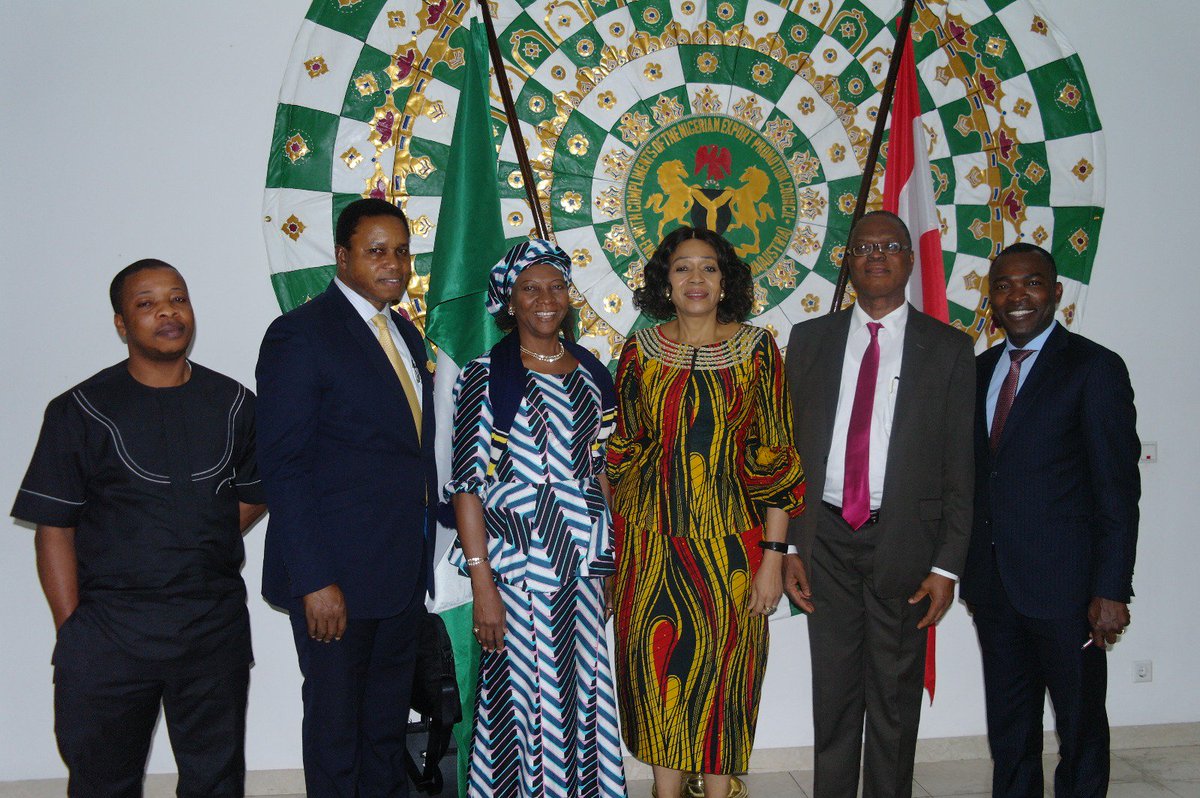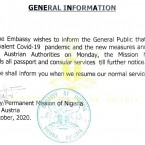Chancery Journal
Lessons from the Attack on the Nigerian Embassy in Vienna

\ Updated : 23 October, 2020 by Koko Esin
On 21st October, 2020, while news of the Nigerian armed forces killing innocent #EndSARS protesters spread, a group of Nigerians in Austria gathered outside the Nigerian Embassy Office in Vienna. Their initial goal is believed to have been to vent their frustrations in response to the recent announcement by the Embassy to suspend all consular services (including passport application) until further notice "due to the prevalent Covid-19 Pandemic" [See Attachment Below Page]. The protesters were generally peaceful and seized the opportunity to stand in solidarity with the #EndSARS protesters back home, among other other issues like their demand to the embassy to End the alleged daily deportation of Nigerians from the region. They held up signs one of which read "End Bad Leadership, We Need Peace In Nigeria" as the generally peaceful protest continued. However, as a Nigerian envoy who seemed to pay no attention to their demands made his way narrowly through the crowd of frustrated Nigerians to the gates of the fortified mission, he quickly became the target of slurs against the Buhari Administration and a brief shoving showdown that was captured on cellphone video and shared on social media by many people in the group.
Unlike multiple media outlets reported, the Ambassador herself was neither present nor physically attacked in the encounter. However, the symbolism of the incident should not be downplayed as anyone in the envoy's shoes was bound to be faced with similar fate. More importantly, protests and attacks on Nigerian Diplomatic Missions around the world have increased by 450% between 2016 and 2020, making the issue worthy of serious attention. On the same day of the Vienna protest, there was a similar #EndSARS protest against the Nigerian High Commission in Pretoria, South Africa, in which protesters threw a water bottle at the High Commissioner and burned the Nigerian Flag. Similar #EndSARS protests had taken place and are still taking place against Nigerian Diplomatic Missions around the world. However, the manifestation of frustration of Nigerians with Nigerian missions around the world in recent times are better understood beyond their mere surface triggers of SARS and CoVID-related policies.
Prior to the Vienna incident, the most recent issue was an escalation of rowdiness in the Nigerian Embassy in Bern, Switzerland, on 18th September, 2020, for which the Embassy staff called the Swiss Security Services (law enforcement unit) against the Nigerians they are paid and pledged to serve. Preceeding that was a stand-off between yet another group of frustrated Nigerian Passport applicants and staff of the Nigerian High Commission in Ottawa, Canada, on 14th August, 2020, in which the frustrated Nigerians physically blocked the entrance/exit of the Mission for a brief moment until the situation was eventuallly quelled via a combination of threats and what Nigerians described as "empty promises" by the Mission Officials in Ottawa. The most severe of the recent attacks by frustrated Nigerians abroad was against the Nigerian Embassy in Jakarta, Indonesia that resulted in the damage and vandalism of the Embassy property. According to some Nigerians living in Jakarta, the attack on 25th June, 2020, was triggered by the Mission's negligece - lack of comment and/or action in response to the expoitation and deaths of Nigerians in situations involving the Indonesian Authorities.
As if Nigeria did not already have enough problems, that attack on the Nigerian Embassy in Jakarta was preceded by another incident merely days apart in which armed Non-Nigerian elements stormed and demolished the Nigerian High Commission living quarters in Accra, Ghana, in what was later deemed a "property dispute" and a "misunderstanding" for which the Ghanaian Government later apologised and promised to "look into". All said and done, what's the takeaway from all of these attacks? An old African proverb says the only gains from a crisis is the lessons left behind. So, rather than write-off the frustrated Nigerian protesters/rioters/attackers as "hoodlums", here are some lessons Nigerian Missions around the world can draw from these incidents.
1. Nigerian Missions cannot afford to function in isolation from the wider Nigerian Community.
This is especially true for missions in host countries with a large number of Nigerian Residents, e.g. Cameroon. The mission has to operate as a Nigerian House and treat all Nigerians as members of the family. This person to person relationship creates greater co-operation between the mission and the people, going a long way to serve many purposes including Effective Communication - ability to spread the mission's announcements easier, further and wider among the Nigerian Community and the ability to obtain relevant information from the Diaspora. With this type of relationship, even in worse case senarios when the consular service cannot be rendered, the frustration of Nigerians will be superceded by their patience and understanding that the mission is making its best efforts. We have noticed many such senarios in the Nigerian Consulate in Buea, Cameroon where the Nigerian Community leaders related with the Mission and handled certain communications to Nigerians effectively on behalf of the mission. On the other hand, operating the Mission in isolation just lets Nigerians assume the regular: "They are just there chopping money and neglecting us".
2. Long Accumulated Frustrations when Vented can have a Bigger Impact than smaller frustrations.
Those smaller issues like frequent lack of passport booklet indicate wider efficiency problems that pile-up frustration among Nigerians. Some times it takes as little as passing the right information across, through simple reply of an email or answering of the phone. However, Nigerian Missions around the world are commonly alleged to have a reputation of ignoring those digital communication channels, making the public relations job become even more cumbersome. There is a story about a Nigerian student in China who needed a single piece of information from the Embassy, to make a timely decision. He lived and studied in Liaoning Province where there are no Nigerian Establishments. When his student visa was about to expire, he needed to know whether to enroll for a new semster and his decision was ultimately going to be based on what the Embassy tells him. However, he got no response and no letter from the Embassy, no emergency flights to leave China during CoVID-19 and he eventually overstayed his visa and got into bigger problems with the Chinese Authorities. His frustration is the type that easily translates to protests against the mission. Small issues need to be addressed swiftly to prevent them from morphing into problems too big to be handled.
3. Nigeria's Official Representative should reflect the Interest of Majority of Nigerians.
Most Nigerians from large tribes are ethnocentric, just like other Africans, Asians, etc. In other words, people are more comfortable and relate better with leadership from their own ethnicity. The leadership of a country should reflect this reality and so should the administration of a diplomatic mision. In China, for example, the total population of Nigerians in the country as at 2013 was comprised of 61% Igbo, 22% Hausa and Fulani, 15% Yoruba and 12% minority tribes. Yet most of the Ambassadors sent to the country have been Northerners, against whom the wider Nigerian community had complained of abandonment and negligence. The outcry of Nigerians against the Nigerian Mission in Beijing eventually prompted the Nigerian Foreign Affairs Ministry to establish a Consulate General of Nigeria in the Chinese southern city of Guangzhou in 2014, headed by an easterner. The effect of that move was that many Nigerians became comfortable, at ease and re-assured that their concerns as Nigerians would be respected and taken seriously.
However, beyond the issue of ethnicity and the tendency to distrust the effectiveness of representative from non-majority ethnic group, there has been a lack of representation of interest of the majority of Nigerians in countries where the Nigerian diplomatic missions exist. The Federal Government is currently attempting to address this issue with the greater funding and involvement of the Nigerian Diaspora in business promotion events, culltural exchange and education. The positive effects of these efforts are expected to be seen in the coming years.
